SEPTEMBER 26- TODAY’S READING FROM THE ONE YEAR BIBLE- ISAIAH 48:12- 50:11; EPHESIANS 4:17-32; PSALMS 69:1-18; PROVERBS 24:5-6
TODAY’S READING FROM THE OLD TESTAMENT- ISAIAH 48:12- 50:11
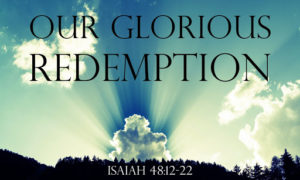 We can trust God’s timing in all things. He will judge (and does judge) Babylon (and all that that city represents in Revelation 17-18). He will do so His way, by His means, and in His time.
We can trust God’s timing in all things. He will judge (and does judge) Babylon (and all that that city represents in Revelation 17-18). He will do so His way, by His means, and in His time.
Isaiah 48:14 14 “Assemble, all of you, and listen! Who among them has declared these things? The LORD loves him; he will carry out His good pleasure on Babylon, And His arm will be against the Chaldeans.
If the people of Judah had obeyed the Lord from the start, they would have experienced peace and not war. But the Babylonian conquest and the 70-year captivity was due to chastisement for their stubborn rebellion (48:18-19).
When in Babylon, some of the Jews grew complacent. When Cyrus issued his decree giving them permission to return to Jerusalem, many decided to stay because of their comforts and affluence. This serves as a warning for all those who get comfortable with their various bondages and don’t take God’s offer for deliverance.
Jesus asked the man at the pool of Bethesda, “Do you wish to be made whole?” (John 5:6) He had been in bondage to sitting on a pallet for 38 years (the same amount of years that Israel had been under the Law in the wilderness). Jesus asks a probing question. Did he really want to take up his mat and walk? (John 5:1-9) Do we really want to be free from that which keeps us in bondage?
Isaiah 48:20 20 Go forth from Babylon! Flee from the Chaldeans! Declare with the sound of joyful shouting, proclaim this, send it out to the end of the earth; Say, “The LORD has redeemed His servant Jacob.”
Are we ready to move when God calls us? Do we cling to our comfort zone? Have we become passive when it comes to living in a culture that does not honor God?
Isaiah will amplify the call to the Jewish remnant to depart from Babylon in Chapter 52, and Paul uses it as a call to holiness in his New Testament letter to the Corinthians.
Isaiah 52:11 11 Depart, depart, go out from there, Touch nothing unclean; Go out of the midst of her, purify yourselves, You who carry the vessels of the LORD.
2 Corinthians 6:17 17 “Therefore, COME OUT FROM THEIR MIDST AND BE SEPARATE,” says the Lord. “AND DO NOT TOUCH WHAT IS UNCLEAN; And I will welcome you.
Chapter 49 presents the Messiah as the true Servant, the true Israel, ‘ruled by God’.
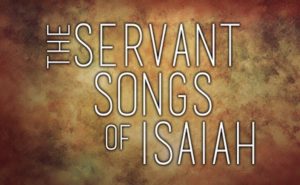 There are four Servant Songs in Isaiah. The first was Isaiah 42:1-4. The second Servant Song is in Chapter 49:1-6; the third is found in Chapter 50:4-7 and the fourth in Chapters 52:13-53:12.
There are four Servant Songs in Isaiah. The first was Isaiah 42:1-4. The second Servant Song is in Chapter 49:1-6; the third is found in Chapter 50:4-7 and the fourth in Chapters 52:13-53:12.
Chapter 49:1- 50:3 presents Christ as God’s servant in relationship to the Gentiles.
Chapter 50:4 -11 presents Christ in relationship to His Father, and Chapter 51:1- 52:12 presents Christ in relationship to Israel.
The Messiah will raise up the tribes of Jacob and restore the preserved ones of Israel, but the Lord says that He will also be a light to (and of) the nations (Gentiles) (Isaiah 49:6).
The Messiah’s perfect obedience on behalf of His people will be the means whereby the people can keep their covenant commitment to God and be restored as heirs to the promise.
Through the work of the Messiah, the LORD will make a way where there was no way. He will raise up a highway whereby the Gentiles will have access to God.
God’s favor shown to the Gentiles by no means indicates He is abandoning Israel.
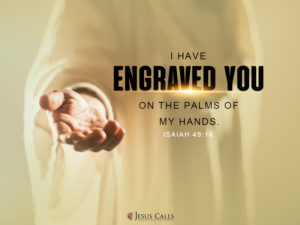 Isaiah 49:14-16 14 But Zion said, “The LORD has forsaken me, And the Lord has forgotten me.” 15 “Can a woman forget her nursing child and have no compassion on the son of her womb? Even these may forget, but I will not forget you. 16 “Behold, I have inscribed you on the palms of My hands; Your walls are continually before Me.
Isaiah 49:14-16 14 But Zion said, “The LORD has forsaken me, And the Lord has forgotten me.” 15 “Can a woman forget her nursing child and have no compassion on the son of her womb? Even these may forget, but I will not forget you. 16 “Behold, I have inscribed you on the palms of My hands; Your walls are continually before Me.
Salvation is of the Jews (John 4:22). When Jesus and His disciples launched His Messianic ministry, they went to the Jew first (Matthew 10:5-6; 15:24; Luke 24:44-49; Acts 3:25-26). The Apostle Paul spoke of the gospel being to the Jew first (Romans 1:16). Only after Paul and Barnabas had ministered to the Jews first in the synagogues did they turn to focusing their ministry on the Gentiles (Acts 13:46-47).
There is a greater deliverance in view than that provided by Cyrus’ decree in 536 BC. God will call the Jewish nation back to Himself and gather them in their land. Gentiles will come to their light and kings to the brightness of their rising (Isaiah 60:3).
A restored Israel will bring the nations into its state of blessing, and they will adorn her as jewels adorn the neck of a bride (Isaiah 49:18).
 Warren Wiersbe describes Israel’s favor in the eyes of the Gentile nations, saying, “kings and queens will be babysitters for Israel’s children!” (The Bible Exposition Commentary – The Prophets by Warren Wiersbe). (see Isaiah 49:23).
Warren Wiersbe describes Israel’s favor in the eyes of the Gentile nations, saying, “kings and queens will be babysitters for Israel’s children!” (The Bible Exposition Commentary – The Prophets by Warren Wiersbe). (see Isaiah 49:23).
In both the deliverance of the Jews from their Babylonian captivity and their salvation in the future when they turn in faith to Christ, the Lord proves Himself to be “the Savior, the Redeemer, the Mighty One of Jacob” (49:26).
In Chapter 50, the Lord shows Himself to be Israel’s constant lover, and yet she is an unfaithful wife. The Bible often refers to Israel as the wife of Yahweh (Isaiah 54:4-5; 62:1-5; Jeremiah 2:1-3; 3:1-11; Hosea 2; Ezekiel 16). The LORD betrothed Israel to Himself when He made a covenant with her at Sinai (Exodus 19-20). However, Israel quickly played the harlot when she worshiped the golden calf and other idols throughout its history. Despite Israel’s unfaithfulness, Yahweh did not issue a certificate of divorce. Under the Mosaic covenant, if a divorce certificate was issued, the former marriage ends, and the woman is free to marry again but cannot return to her former husband (Deuteronomy 24:1-4). The LORD does divorce the northern kingdom (Jeremiah 3:8) but not the southern kingdom of Judah. He would forgive her after her chastening by the Babylonians and receive her back to Himself.
Isaiah gives another picture of a family sold into servitude. “To whom of My creditors did I sell you? Behold you were sold for your iniquities.” In other words, they were the ones who sold themselves into slavery, not God.
As for the Lord, His hand is not so short that it cannot ransom, so weak that it has no power to deliver (50:2). He superintends over all the events, good and bad (50:3).
Verse 4 introduces the third servant song (See Isaiah 42:1-7; 49:1-7). Whereas His suffering is hinted at in the first two songs, it is more obvious here. In the fourth Servant Song (Isaiah 52:12-53:12), we will see what that suffering was necessary for our redemption.
The title “Lord God” is used 4 times here and signifies His sovereign authority. No one takes His life from Him; He voluntarily lays it down. Jesus makes this clear in John 10.
John 10:18 18 “No one has taken it away from Me, but I lay it down on My own initiative. I have authority to lay it down, and I have authority to take it up again. This commandment I received from My Father.”
 Isaiah 50:6 6 I gave My back to those who strike Me, And My cheeks to those who pluck out the beard; I did not cover My face from humiliation and spitting.
Isaiah 50:6 6 I gave My back to those who strike Me, And My cheeks to those who pluck out the beard; I did not cover My face from humiliation and spitting.
Jesus rose early to seek the will of God the Father (Mark 1:35). He prayed for guidance (John 11:42). Jesus was dedicated to doing only what pleased His Father (John 5:19, 30; 6:38; 8:28). For our sake, He meditated upon the Word that we might have His Word sustaining us.
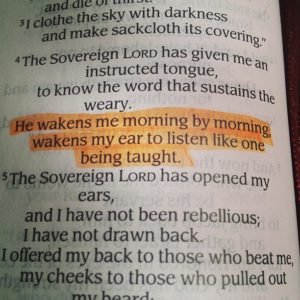 His perfect obedience is in view:
His perfect obedience is in view:
Isaiah 50:4-5 4 The Lord GOD has given Me the tongue of disciples, That I may know how to sustain the weary one with a word. He awakens Me morning by morning, He awakens My ear to listen as a disciple. 5 The Lord GOD has opened My ear; And I was not disobedient, nor did I turn back.
Jesus was determined to lay down His life to atone for our sins. He “Set His face like a flint” to go to Jerusalem (Luke 9:51) to endure the suffering of the cross.
 Isaiah 50:7 7 For the Lord GOD helps Me, Therefore, I am not disgraced; Therefore, I have set My face like flint, And I know that I will not be ashamed.
Isaiah 50:7 7 For the Lord GOD helps Me, Therefore, I am not disgraced; Therefore, I have set My face like flint, And I know that I will not be ashamed.
Verse 10 is a call to faith in Christ: Isaiah 50:10 10 Who is among you that fears the LORD, that obeys the voice of His servant, that walks in darkness and has no light? Let him trust in the name of the LORD and rely on his God.
 Some people try to deal with darkness by kindling their own fire and walking in the light of their vain philosophies and plans of salvation instead of walking in the light of the Son of God.
Some people try to deal with darkness by kindling their own fire and walking in the light of their vain philosophies and plans of salvation instead of walking in the light of the Son of God.
Isaiah 50:11 11 Behold, all you who kindle a fire, who encircle yourselves with firebrands, walk in the light of your fire and among the brands you have set ablaze. This you will have from My hand: You will lie down in torment.
TODAY’S READING FROM THE NEW TESTAMENT – EPHESIANS 4:17-32
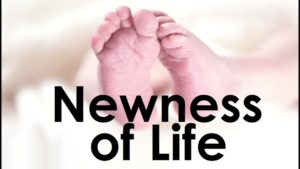 We are made new in Christ. Therefore we are called to walk in the newness of our life in Christ. Have you learned the truth of Christ’s life? It is Christlike!
We are made new in Christ. Therefore we are called to walk in the newness of our life in Christ. Have you learned the truth of Christ’s life? It is Christlike!
We are not to imitate the lives of those who are not ‘in Christ’. Paul references the pagan lifestyle of the Ephesians as ‘walking as the unconverted Gentiles’ (Ephesians 4:17). We are to think differently (no longer walking in the futility of the natural mind). We have the Word and the Spirit enlightening the eyes of our heart’s understanding (4:18; 1:18). We are no longer alienated from the life of God; therefore we are no longer ignorant or helpless. We have wisdom, revelation and the power of the Indwelling Holy Spirit. Our old hearts were callous, hard, impure, sensuous and greedy.
 But we have learned by experience, having come to know Jesus personally as our Lord and Savior, that His life is altogether different. It is altogether holy.
But we have learned by experience, having come to know Jesus personally as our Lord and Savior, that His life is altogether different. It is altogether holy.
As Christians alive to God and His righteousness, we must be diligent to put off the old self. The old self does not get better. It is corrupt and being corrupted. We should have a distaste for any semblance of its inclinations and behavioral patterns.
Paul tells us to be watchful of our speech. Is there any hint of our Adamic nature coming out in our communication? We are to lay aside falsehood and speak the truth in love, letting no corrupt communication proceed out of our mouths, but that which is good for edification and is according to the need of the moment, ministering grace to the hearers (Eph. 4:29).
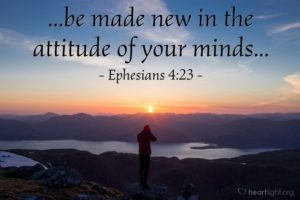 We are to guard our hearts from any resentment, bitterness, jealousy, or anger. We must resolve conflicts in a God-honoring timely way, not letting the sun go down on our wrath.
We are to guard our hearts from any resentment, bitterness, jealousy, or anger. We must resolve conflicts in a God-honoring timely way, not letting the sun go down on our wrath.
We need both Spirit-empowered de-habituation, putting off the old habits, and re-habituation, putting on new ones. For example, no longer stealing, but instead becoming fiscally solvent and a generous giver to those in need (4:28).
We are learning Christ by being sensitive to the witness of the Holy Spirit, who is grieved when we sin (Ephesians 4:30).
Learning Christ means that the Holy Spirit is shedding the love of God abroad in our hearts (Romans 5:5), and we are tender-hearted and kind to one another, forgiving one another just as God in Christ also has forgiven us (4:32).
TODAY’S READING FROM THE BOOK OF PSALMS- PSALM 69:1-18
This is the psalm that is quoted most often in the New Testament except for Psalms 22 and 110. It has been described as a psalm’ pulsating with pain’.
 In our reading of the Servant Song from the prophet Isaiah (Chapter 50) we got a preview of the sufferings of Christ in the Old Testament. We get another here in Psalm 69, although the man crying out in this Psalm, admits that he is not sinless (v.5). Jesus was sinless, yet He was treated as one who was numbered with the transgressors (Isaiah 53:12; Luke 22:37).
In our reading of the Servant Song from the prophet Isaiah (Chapter 50) we got a preview of the sufferings of Christ in the Old Testament. We get another here in Psalm 69, although the man crying out in this Psalm, admits that he is not sinless (v.5). Jesus was sinless, yet He was treated as one who was numbered with the transgressors (Isaiah 53:12; Luke 22:37).
This man cries out, and yet there seems to be no answer. Yet, he knows God is good and will answer according to His love and mercy.
The Psalmist is a recipient of human cruelty and injustice. And like him, Jesus knew what it meant to be hated without a cause.
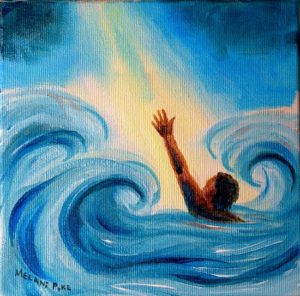 Psalm 69:4 4 Those who hate me without a cause are more than the hairs of my head; Those who would destroy me are powerful, being wrongfully my enemies; What I did not steal, I then have to restore.
Psalm 69:4 4 Those who hate me without a cause are more than the hairs of my head; Those who would destroy me are powerful, being wrongfully my enemies; What I did not steal, I then have to restore.
Jesus refers to this passage in John 15:25
John 15:25 25 “But they have done this to fulfill the word that is written in their Law, ‘THEY HATED ME WITHOUT A CAUSE.’
His suffering seems to be the consequence of his obedience. He is mindful that the stigma that has come upon him could put others to shame and may cause them to take offense. As a result, he is alienated from friends and family (v.6-8). Jesus experienced the scorn of his family (John 7:5; Mark 3:31-32). Jesus experienced scorn because He was identified with God, and people scorned God.
Psalm 69:9 9 For zeal for Your house has consumed me, And the reproaches of those who reproach You have fallen on me.
The Apostle John relates this to Christ in John 2:17, and Paul relates this to Christ in Romans 15:3.
Romans 15:3 3 For even Christ did not please Himself; but as it is written, “THE REPROACHES OF THOSE WHO REPROACHED YOU FELL ON ME.”
The Psalmist perseveres in prayer with his anchor cast upon the truth of God’s steadfast love that is good and merciful (v. 13, 16).
We can say that Jesus is the answer to the following prayer of the Psalmist:
Psalm 69:18 18 Oh draw near to my soul and redeem it; Ransom me because of my enemies!
TODAY’S READING FROM THE BOOK OF PROVERBS – PROVERBS 24:5-6
Proverbs 24:5-6 5 A wise man is strong, And a man of knowledge increases power. 6 For by wise guidance you will wage war, and in abundance of counselors there is victory.
The point being made in this set of proverbs is that to be victorious or successful there must be wise guidance. It is this wisdom that gives you strength and the upper hand in the conflicts of life.
PRAY FOR THE NATIONS – PAKISTAN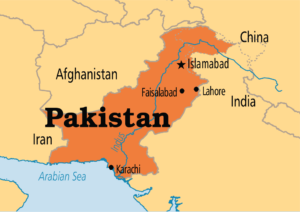
- Pray for the spiritually oppressed in remote areas to encounter the Gospel.
- Pray for the Church to multiply in the power of the Spirit as persecution intensifies.
- Pray for the strongholds of Islamist extremism and terrorism to be demolished and rendered powerless.
Pakistan is a complex blend of old and new. Ancient Islamic influences predate the country itself. It is home to Taxila, one of the oldest universities in the world. Dozens of distinctive cultures are also scattered through the various tribes in the Karakoram mountain range. With a fusion of diverse customs, this nation finds unity through the predominantly shared Islamic faith on which it was founded.
 After Pakistan’s formation in 1947, it went to war with India over the Kashmir land. Though this particular conflict only lasted from 1947 to 1948, the region remains contested to this day. Despite its rich culture, Pakistan is a poor nation with bleak economic outlooks. An estimated 35% of the people live in poverty, and children are often pulled out of school to help provide for their families. Substance abuse is rampant; this is the most heroin-addicted country in the world. Pakistan was also the seventh country to successfully develop and test nuclear weapons. In addition, terrorism has brought widespread devastation, killing thousands and hindering any economic development. From as early as 2005, Pakistani schools have been targeted by the Taliban, and hundreds of students have been killed. Fragile government control has allowed the Islamic State and many other Islamic terrorist groups to thrive. Tribal lands, which are largely outside the government’s control, have become safe havens for lawlessness and a regrouping point for the Taliban.
After Pakistan’s formation in 1947, it went to war with India over the Kashmir land. Though this particular conflict only lasted from 1947 to 1948, the region remains contested to this day. Despite its rich culture, Pakistan is a poor nation with bleak economic outlooks. An estimated 35% of the people live in poverty, and children are often pulled out of school to help provide for their families. Substance abuse is rampant; this is the most heroin-addicted country in the world. Pakistan was also the seventh country to successfully develop and test nuclear weapons. In addition, terrorism has brought widespread devastation, killing thousands and hindering any economic development. From as early as 2005, Pakistani schools have been targeted by the Taliban, and hundreds of students have been killed. Fragile government control has allowed the Islamic State and many other Islamic terrorist groups to thrive. Tribal lands, which are largely outside the government’s control, have become safe havens for lawlessness and a regrouping point for the Taliban.
Over 95% Muslim, with a Sunni majority, Pakistan is the third largest Islamic nation – and the center of the unevangelized world. Despite constitutional guarantees of religious freedom, this is one of the world’s most persecuted nations. Though it is less than 2% of the population, Christianity is the second largest religious minority. Countless Christian villages dot the Punjab heartland, with a significant population in the southern city of Karachi. But Bible translation remains very difficult, and only a few of the seventy languages have a completed New Testament. With much of the country controlled by Islamic fanaticism, believers face extreme persecution and are often among the poorest. Yet, in the face of conflict and despair, prayer movements are rising up, and Muslims are increasingly coming to Christ!
PRAYER: O Lord God, thank You for hearing our desperate cry for salvation. We had no leg to stand on. Our own foundation for righteousness was as quicksand, reproving us of our hypocrisy. We thank You for revealing Christ to us as our only hope for a rescue and for drawing us to His thorn-pierced brow, His wounded side, and showing us His nail-pierced hands. He was numbered among the transgressors and bore our iniquities. The chastisement that brought us peace fell upon Him, who knew no sin. By His stripes, we have been healed. As those who have been reconciled, help us to put off the old self and put on the new, no longer thinking or behaving as those who are not converted. May we walk in the newness of life as a testimony of Your saving grace. In Jesus’ Name. Amen.
